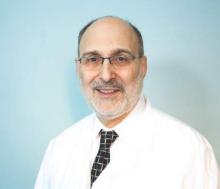When patients say they had “a reaction” to some treatment, they often don’t mean what we would call allergy or even intolerance. This doesn’t make their reluctance – or refusal – to consider what we suggest any less insistent.
I’ve lost track, for insistence, of the number of patients who called 2 days after I prescribed clindamycin lotion to complain that it “dried me out completely.”
When a customer in a cosmetic store or pharmacy returns a skin care cream because of that kind of “reaction,” the store takes it back, no questions asked. This is not just good business practice; in that context, both the customer and the salesperson use the word “reaction” the way laymen do, not the way doctors do.
If you doubt a reaction is real and say so, however gently, the response you may get is, “That may be true, Doctor, but my body is sensitive. I get strange reactions.”
Like most everyone else in practice, I use negotiating tactics, such as: “Stop the cream for 3 days, then try it again, but just in one spot in front of your left ear.”
Some patients agree to try this. Mostly, nothing happens, they resume the medication, and life goes on. For fearful people, we have to use something else. Sometimes patients and I run through a succession of options, each of which produces an inscrutable “reaction.”
As the years pass, I’ve gotten better at gauging the range of true reactions to medications. At the same time, the list of perplexing things patients complain about gets longer all the time. Lately, there’s been a run of them:
• The woman who used low-strength tretinoin cream all of twice and stopped 2 weeks ago who insisted that “my face is still all dried out.” I assured her that 2 days of tretinoin cannot damage the skin forever, but she remains unconvinced.
• The man who says that putting tretinoin on his face “made me dry out all over.”
• The mother who said her daughter stopped my steroid cream because “every time we used it, her tongue broke out in blisters.”
• The middle-aged woman who claimed, “I can’t take minocycline because it changed the color of my teeth and my eyes.”
• The young woman who puts clindamycin pads only on her right cheek, where she still has pimples, but not on the left, “because it makes the pimples go away on the cheek that has them, but on the other side it makes pimples come out.”
When I hear complaints like these, I just sigh and make a lateral move.
But sometimes I run out of lateral moves. The other month a woman told me that doxycycline made her “tired.” We tried minocycline, but that made her “irritable.” “My body is prone to strange reactions that no one else gets,” she explained. Then she asked for a third option.
“I honestly don’t know what to suggest,” I apologized. “Because your body reacts in ways that other people don’t, I can’t predict what some other treatment will do to you, even if it hasn’t done it to anyone else.”
She asked for her records, to get another opinion. I happily complied.
Speaking of weird “reactions,” there are of course the ones listed on e-scribing programs. Here are a couple:
• Hydrocortisone valerate has been associated with WARTS. (Capitalized)
• Hydrocortisone valerate has been associated with tinea cruris.
Make any sense to you? Me neither.
I end with a call I got the other day from a pharmacist. This concerned a patient for whom I had prescribed oral doxycycline and topical tretinoin. The message was, “Please call regarding drug interaction.”
When I got through, I politely asked the nature of this interaction. The pharmacist said she didn’t know exactly, but would look into it and fax me the details.
Half an hour later I got a sheet explaining the there is an increased risk of pseudotumor cerebri when patients take both oral tretinoin and oral tetracyclines.
That is correct: Not isotretinoin. Oral tretinoin. Used any oral tretinoin lately?
At any rate, the helpful pharmacist wrote at the bottom, “This interaction is flagged by several insurers for topical tretinoin too.”
Thank heavens for computer-generated warnings. Whatever would we do without them?
Besides, it’s nice to know that even after all these years, I can still react myself, with surprise.
Dr. Rockoff practices dermatology in Brookline, Mass. He is on the clinical faculty at Tufts University School of Medicine, Boston, and has taught senior medical students and other trainees for 30 years. Dr. Rockoff has contributed to the Under My Skin column in Dermatology News since January 2002. Write to him at dermnews@frontlinemedcom.com.


